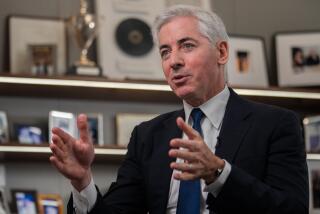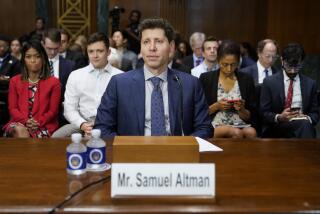Herbalife takes another bite out of Bill Ackman
- Share via
Followers of Herbalife, the Los Angeles peddler of nutritional supplements, know it’s actually two stories rolled into one.
One is the story of how a company with a questionable business model, overhyped products, and an almost invisible research and development program can rack up ever increasing profits year after year, producing a gain in its stock price of some 140% year to date.
The second story is what that performance has done to Bill Ackman.
Ackman is the hedge fund manager who made an audacious bet against Herbalife a year ago, declaring at an investor conference that he had shorted $1 billion in Herbalife shares on the expectation that regulatory investigations would knock the shares down to zero. He backed up his announcement with a heroically detailed Power Point presentation about Herbalife’s shortcomings, arguing that the company is basically just a pyramid scheme.
Ackman has lost $500 million on that bet so far, according to at least one Wall Street estimate. Back in October, he disclosed that he had pared his initial short by about $400 million, replacing the shorts with put options that will allow him to profit if Herbalife shares fall, without facing the risk that a short squeeze will drive them up.
Ackman could yet be right about regulatory scrutiny of Herbalife, though his timing is plainly off. But the fate of his investment says rather more about his tactics than his long-term strategy. His original announcement, as it turned out, drew a passel of anti-Ackmans out of the woodwork, on the buy side. Not the least of these was Carl Icahn, who clearly had an ugly history with Ackman and relished the opportunity to put the squeeze on a short-seller who had been unwise enough to proclaim his vulnerable position to the world.
But it would be wrong to interpret Herbalife’s soaring stock price and financial results as a validation of its business model or its product line. The company hawks its nutritional shakes and other products via shameless testimonials. As we reported in February, Herbalife claims an “affiliation” with UCLA that the university should find terminally embarrassing. Its research and development budget is $1 million, or two-hundredths of a percent of its revenue. Contrast that with a legitimate pharmaceutical company -- Merck, for instance, which spends 18% of its revenue on R&D.
As my colleague Stuart Pfeifer has reported, the company targets Latinos as a prime market. That has raised the hackles of several Latino advocacy groups, who have asked federal regulators to investigate whether the company is misleading people into thinking that working as an independent Herbalife distributor is a pathway to wealth.
Yet the juggernaut rolls on. Ackman based his short bet on the notion that Herbalife’s success was based on exploiting consumer gullibility, and that eventually the business model would be exposed by the regulators or collapse on its own. In the short term he’s been wrong. But in the long term?
More to Read
Inside the business of entertainment
The Wide Shot brings you news, analysis and insights on everything from streaming wars to production — and what it all means for the future.
You may occasionally receive promotional content from the Los Angeles Times.











